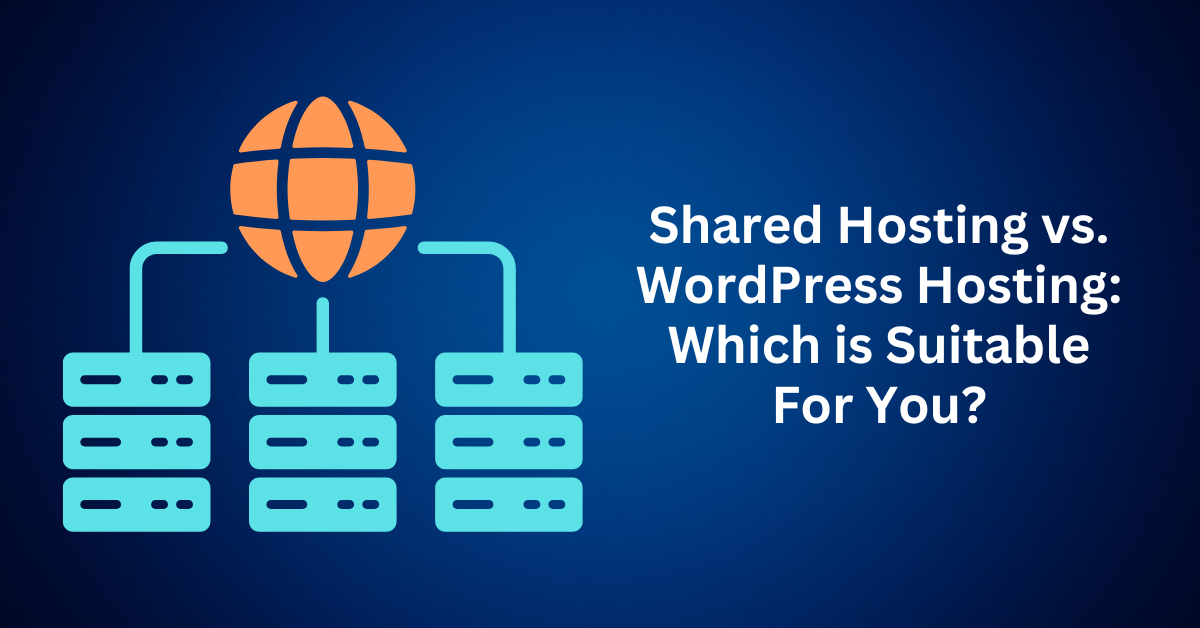WordPress is one of the most popular CMS platforms that powers over 800 million websites globally. With WordPress, you will need to have your web hosting server ready to install the application. There are two main low-cost web hosting services that you can use when starting. Shared Hosting vs. WordPress Hosting.
Today, we will be sharing the difference between Shared Hosting and WordPress Hosting, and also how you should choose the best plan for your web hosting requirements.
Start with Bluehost Web Hosting Now

Table of Contents
ToggleWhat is Shared Hosting? – Shared Hosting vs. WordPress Hosting
Shared hosting is a popular hosting solution that enables you to bring your website online without the complexities and expenses associated with managing a dedicated server.
In shared hosting, your website shares server resources with other websites hosted on the same server. This cost-effective approach allows hosting providers to distribute server maintenance and operational expenses among multiple users. This, as a result, provides a more affordable hosting option for small businesses and individuals.
Shared hosting providers typically offer a user-friendly control panel. This will enable you to manage your websites easily. With the control panel, you can upload files, create an email account, and install applications like WordPress.
However, it’s important to be aware that shared hosting comes with certain trade-offs. Since multiple websites are using the same server resources, neighbouring sites’ activities might affect your performance.
If another website experiences a sudden surge in traffic or consumes excess resources, it might lead to slower loading times or decreased responsiveness for your website. Additionally, customization options might be limited compared to more advanced hosting solutions. You will not have full control over server configurations.
Despite these potential limitations, shared hosting suits the needs of a new website that is just starting out or running a small-scale online presence. It offers an accessible and budget-friendly way to establish your website and gain an online foothold.
And when your website grows, you can always upgrade to a more robust hosting option.
Start with Bluehost Web Hosting Now
What is WordPress hosting? – Shared Hosting vs. WordPress Hosting
WordPress is one of the most popular Content Management Systems (CMS). It powers millions of websites out there. Within this realm, the concept of WordPress hosting emerges as a tailored solution that caters to the unique needs and nuances of WordPress-powered websites.
WordPress demands a hosting environment that not only understands its intricacies but also enhances its potential. The WordPress hosting service serves as the proverbial stage where this content management system (CMS) takes centre stage, captivating audiences with its seamless performance, heightened security, and specialized support.
Optimized Ecosystem
WordPress hosting is an ecosystem designed to maximize the capabilities of WordPress. In many ways, its performance is comparable to handing a perfectly tuned instrument to a virtuoso musician. More specifically, by configuring servers with WordPress-specific settings and caching mechanisms, WordPress hosting delivers lightning-fast loading times, ensures seamless user experiences, and provides the scalability to handle traffic surges without missing a beat.
Automatic Updates
Moreover, automatic updates for both the WordPress core software and plugins are orchestrated with precision. This ensures that your website remains at the forefront of technological advancements and is safeguarded against potential vulnerabilities.
Security Measures
Because of its widespread popularity, WordPress often becomes a prime target for cyber threats. To counter this, WordPress hosting comes equipped with fortified security measures. In particular, robust firewalls, regular security scans, and advanced malware detection systems work together to form a strong defense against malicious attacks. As a result, website owners gain peace of mind knowing their sites are well-protected while they focus on growth and content creation.
However, what truly elevates WordPress hosting is the tailored support it offers. Much like a backstage crew ensuring a seamless theatrical performance, the experts behind WordPress hosting are well-versed in the intricacies of the CMS.
Whether you’re an entrepreneur, artist, blogger, or business mogul, having a support team that understands the nuances of WordPress can be the difference between a smooth sail and a rocky voyage.
WordPress hosting emerges as a specialized sanctuary where the magic of WordPress thrives. It’s not merely a hosting solution. However, it’s a symphony of performance, security, and support, orchestrated to harmonize with the complexities of WordPress.
Different Options for WordPress Hosting
You need to understand what type of WordPress hosting you get. It can be shared hosting, VPS hosting, dedicated hosting, or cloud hosting.
Dedicated hosting offers the most exclusive service as the entire server is dedicated to you. VPS hosting uses a virtual server partitioned from a physical server, with each virtual server functioning as its own independent server. Each will get its own resources. And for shared hosting, since all are fighting for the same resources, the reliability and performance are lower as you are sharing the resources with other websites on the same server.
And finally, cloud hosting uses a server network that allows for higher scalability. You can expand the resources across other servers in the cloud if required.
Start with Bluehost Web Hosting Now

Shared hosting vs. WordPress hosting: A full comparison
Shared hosting is a low-cost, user-friendly option for web hosting. WordPress hosting, on the other hand, is web hosting optimized for WordPress CMS.
Here, we will compare the differences between the two hosting plans.
Platform Specialization – Shared Hosting vs. WordPress Hosting
Shared hosting is like a multi-purpose venue that can host various events. It supports different content management systems (CMS), such as WordPress, Joomla, and Drupal, as well as custom-coded websites and applications.
If you have a website built on a platform other than WordPress, shared hosting provides the flexibility to host it alongside other websites.
WordPress hosting is specifically optimized to enhance both the performance and compatibility of WordPress websites. To achieve this, it comes with pre-configured settings that ensure seamless integration with the platform. For example, features such as one-click installations, automatic updates, and specialized caching techniques make setup and maintenance far easier.
Ultimately, if your website runs on WordPress, choosing a WordPress hosting plan guarantees that the server environment is finely tuned to meet the platform’s exact requirements.
Web Hosting Performance – Shared Hosting vs. WordPress Hosting
Shared hosting can be likened to carpooling, where multiple passengers share the same vehicle. Similarly, websites on a shared hosting server share resources such as CPU, RAM, and bandwidth.
While this arrangement is cost-effective, it can lead to performance fluctuations during peak usage times. Imagine rush hour traffic causing delays, shared hosting might experience slower loading times during traffic spikes on other hosted websites.
WordPress hosting offers such an exclusive environment for your WordPress website. The server resources are optimized specifically for WordPress. This will result in faster loading times, seamless navigation, and consistent performance. Just as a tailor-made suit fits perfectly, WordPress hosting ensures your website operates efficiently without resource contention.
With WordPress hosting, it can be either shared, VPS, or dedicated hosting. It’s all optimized for the WordPress platform. Even if you are using the same shared hosting options, WordPress hosting should have better performance than generic shared hosting.
Web Hosting Scalability – Shared Hosting vs. WordPress Hosting
Shared hosting is like renting a small storefront: it works well in the beginning, but as your business grows and you need more space for additional products, you may quickly outgrow its limitations. In the same way, as your website gains popularity and experiences higher traffic volumes, a shared hosting environment may struggle to keep up, often resulting in slower performance.
By contrast, WordPress hosting is more like a scalable pop-up shop. As your business flourishes, you can seamlessly expand the shop’s size and offerings, ensuring your website continues to deliver speed, reliability, and a smooth user experience.
WordPress hosting plans adapt to your website’s growth. As your site attracts more visitors or needs extra resources for added content or functionality, you can upgrade your plan easily to maintain optimal performance.
Web Hosting Security – Shared Hosting vs. WordPress Hosting
Shared hosting is like living in an apartment building with shared entrances. While security measures are in place, vulnerabilities in one apartment could potentially affect the entire building.
Similarly, the security of one website on a shared hosting server could impact others if it falls victim to a cyberattack or malware infection.
WordPress hosting is like living in a gated community with dedicated security personnel—every layer works to keep you safe. In practice, this hosting type uses specialized security measures built specifically for WordPress. Features like firewall protection, malware scanning, and real-time monitoring work together to protect your site from potential threats.
Furthermore, the isolated nature of the hosting environment adds an extra layer of protection, ensuring your WordPress website remains secure and reliable.
Customer Support – Shared Hosting vs. WordPress Hosting
Shared hosting offers general assistance, like a concierge at a hotel who can help with various tasks. However, the support might not be as well-versed in the intricacies of different platforms, including WordPress.
If you encounter WordPress-specific issues, you might need to seek external resources for solutions.
WordPress hosting comes with a concierge-level service specifically trained to handle WordPress-related inquiries. These support experts understand the platform’s nuances, troubleshoot issues, and provide guidance tailored to WordPress websites.
It’s akin to having a personal assistant who is an expert in every aspect of your preferences.
Web Hosting Plan Pricing – Shared Hosting vs. WordPress Hosting
When starting a website or your online business, you will focus on the pricing and features. You most probably start with a limited budget.
WordPress and shared hosting will be the best choice for your web hosting now. Both shared and WordPress hosting plans can start with a few bucks, with WordPress typically costing slightly more. This is because it offers more specific optimizations and features that are exclusive to WordPress.
A quick research on one of the top web hosting service providers, Bluehost, both their shared and WordPress hosting plan starts at $2.95/month for a 12-month plan. And you can expect a better deal if you commit for 36 months.
Start with Bluehost Web Hosting Now
How To Choose Between Shared Hosting vs. WordPress Hosting
Now that you know the difference between shared hosting and WordPress hosting. But, how to choose between the shared hosting and WordPress hosting plan?
We created a checklist to help you choose the right plan.
1. Platform Compatibility and Requirements
Consider the platform on which you build your website. Shared hosting is versatile and accommodates various platforms, making it suitable if you have websites using different content management systems (CMS) or custom-coded applications.
On the other hand, if your website runs on WordPress, choosing WordPress hosting gives you specialized configurations that boost performance, strengthen security, and ensure full compatibility with the CMS.
2. Performance and Loading Speed
Evaluate the performance demands of your website. Shared hosting involves sharing resources with other websites on the same server, which can lead to performance fluctuations during peak traffic.
If your website experiences consistent or high traffic levels, WordPress hosting’s optimized environment ensures faster loading times and a smoother user experience, particularly if it’s a WordPress site.
3. Scalability and Growth Projection
Consider your website’s growth trajectory. Shared hosting might suit smaller websites with modest traffic, but as your website grows and attracts more visitors, resource limitations can hinder performance.
WordPress hosting offers scalability tailored to WordPress sites. This will allow you to easily upgrade resources as your traffic increases. Not only that, you can ensure your website can accommodate its growing audience.
4. Security Measures
Analyze the security requirements of your website. Shared hosting offers basic security measures, but can be susceptible to vulnerabilities on other websites hosted on the same server.
WordPress hosting provides specialized security protocols designed to protect WordPress sites against potential threats and attacks. If your website handles sensitive user data or engages in e-commerce transactions, the enhanced security of WordPress hosting is advantageous.
5. Technical Expertise
Consider your technical proficiency. Shared hosting requires less technical expertise, as the provider manages server configurations and updates.
WordPress hosting might demand a bit more familiarity with the platform’s intricacies. This is especially important if you opt for unmanaged WordPress hosting. It will provide more control but requires more hands-on management.
6. Budget Considerations
Factor in your budget. Shared hosting is generally more budget-friendly, making it suitable for small businesses, personal blogs, and those just starting.
WordPress hosting tends to be slightly pricier due to its optimized environment and specialized support. However. The added value in terms of performance and security can be worth the investment.
7. Customer Support
Assess the level of customer support you require. Shared hosting support is often more generalized, whereas WordPress hosting comes with specialized support from experts well-versed in the intricacies of the CMS.
If you need prompt and targeted assistance with WordPress issues, WordPress hosting provides support tailored specifically to your needs.
8. Content Management System (CMS) Flexibility
If you anticipate using different CMS platforms for various websites, shared hosting allows you to host them all under one plan.
However, if you are running a WordPress website, the optimized environment of WordPress hosting enhances its performance and security.
Final thoughts: Shared Hosting vs. WordPress Hosting: Which is Suitable for You?
In short, both shared hosting and WordPress hosting are good options for beginners. Both offer unique features catering to different needs.
Shared hosting is a cost-effective hosting solution for smaller websites that have less traffic. And for WordPress hosting, it provides extra personalization, scalability, and security for the WordPress website.
Start and launch your website today.





